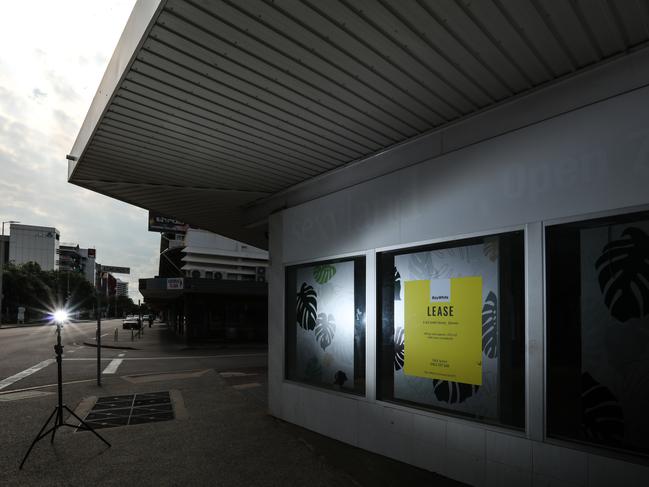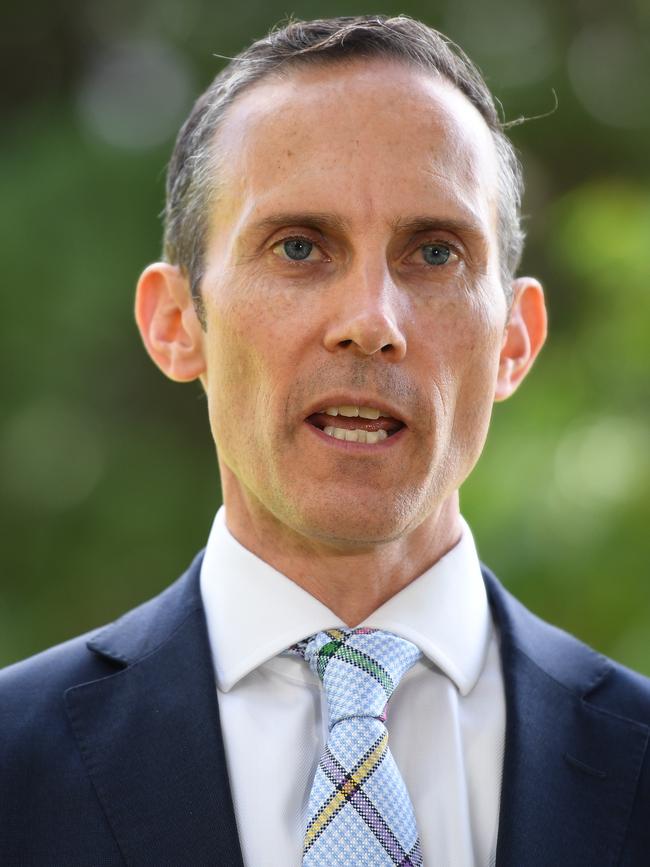Revealed: Every NT business gone bust in 2020
Read the full list of NT companies that have gone to the wall in 2020, as experts warn ‘zombie businesses’ propped up by lenient regulations are dragging otherwise healthy firms down with them.

Northern Territory
Don't miss out on the headlines from Northern Territory. Followed categories will be added to My News.
Temporary measures designed to prevent Australian companies from becoming insolvent could ultimately send more of them to the wall and provide the breeding ground for dodgy operators.
Business leaders are now calling on the Australian Securities and Investments Commission (ASIC) to take a greater role to put a stop to the dodgy practices.
They say the measures may be supporting “zombie businesses” which could cause more companies to fail, while other firms are taking the opportunity to purposely run down their assets.
The government is currently deciding whether some 80 temporary regulatory measures announced by Treasurer Josh Frydenberg in March should be extended beyond September 25, when they are due to expire.

The measures restricted the conditions through which creditors could initiate insolvency proceedings against companies, and increased the time limit for action on a statutory demand for payment from three weeks to six months.
The changes have had a dramatic effect, saving many thousands of jobs in the short term. The number of companies becoming insolvent during June fell to 510, less than half the five-year June average of 1134. In the NT insolvencies declined from a June average of nine to two this year. (Every year some businesses will be put into liquidation simply because they are no longer active or have outlived their purpose.)
But there are concerns the measures will act to the detriment of otherwise profitable firms, who will get left out of pocket by those that fail.
CreditorWatch CEO Patrick Coghlan told News Corp that while extending the relaxed insolvency measures might seem appealing given the harsh economic environment, the measures were “supporting zombie businesses that are continuing to take on more debt” which could ultimately create a domino effect of failing businesses.
“We could see that domino effect because these secondary business to fail when they probably could have survived if they knew which companies were ultimately trading insolvent now,” he said.
Companies across all industries were now waiting an average of 44 days for payment for services – up from 14 days in 2019, Mr Coghlan said.
Payment times in agriculture, manufacturing and construction were holding up pretty well, he said, whereas in administrative services, transport, warehousing and rental hire, they were as much as seven times longer than they were pre-COVID.
“That is really the leading indicator of delinquency, the first thing that we see when we see a debtor is heading to administration,” Mr Coghlan said.
Professor Jason Harris from the University of Sydney said the relaxation of the insolvency laws was “kicking the can down the road”, while Small Business and Family Enterprise Ombudsman Kare Carnell has warned of an “insolvency tsunami” once the laws are retightened.
Professor Harris from the University of Sydney said some businesses were using the “hibernation period” to purposely run down the assets of their companies.
“(It) creates the clear opportunity for what we might call dodgy pre-insolvency advisers, dodgy phoenix operators, who can be basically strip the assets of a company over that six month period and then when the protection period ends, they can hand off effectively a hollowed-out shell to a liquidator, knowing full well that the liquidator won’t have any assets in which to conduct proper investigations or take enforcement action,” he said.
“Insolvency practitioners tell me that they’re very concerned about this happening right now and really what we’re going to need is ASIC to be taking a far greater role in supporting investigation and enforcement action by liquidators, and taking enforcement action itself.”


Mr Coghlan voiced similar concerns.
“We know from previous economic or natural disasters, and this is a combination of both, that where there is chaos there is the opportunity for people to take advantage,” he said.
Thousands of companies could become insolvent very quickly once regulations changed, Mr Coghlan said, and that would mean “liquidators and ASIC will have a huge amount of companies to take a look at, and that means illegal phoenix activity, fraudulent activity, that sort of thing has a better chance of slipping through the cracks.”
Robin Erskine, an insolvency expert of 30 years at Melbourne firm Brooke Bird, said unregulated advisers coulds cause even greater damage to already fragile finances.
“Unfortunately, and you see this every time there is a government payment of any sort … we saw it with the superannuation scams unfortunately. You get people using it for their own benefits that puts businesses in an even worse place.”
ASIC’s Executive Director Assessment and Intelligence Warren Day said the organisation had seen a “significant rise in the number of investment scams” but had not seen an increase in reports of misconduct about untrustworthy advisers.
But in the “perfect storm” of COVID-19, he said, “you could expect to see untrustworthy advisers, using age-old tactics to target companies and business owners in financial stress. Small businesses need to be alert to this, and seek advice from a trusted business Adviser such as an accountant, lawyer or registered liquidator.”
Mr Day said ASIC investigations into potentially illegal activity were not determined by company type.
“We consider a range of factors when assessing a matter, including the seriousness of the conduct, what evidence is available and whether enforcement action is likely to be an efficient and cost-effective use of public resources,” he said.
A spokesperson for Treasurer Josh Frydenberg said the government was “evaluating the future of these regulatory measures as to whether they are extended”.
Labor’s Assistant Treasury Spokesman Andrew Leigh warned that a “snap back” to the old regime could make many businesses insolvent overnight, and that “a sector by sector approach” to getting back to normal “probably makes more sense”.
Melbourne lawyer Steven Palmer of Norton Rose Fulbright warned that if insolvent businesses continue to trade, it could impact all Australians.
“Every time a business doesn’t pay a supplier, the suppliers’ own business is impacted,” Mr Palmer said.
“That in turn leads to a further knock-on effect. Some of the owners of commercial properties are superannuation funds. Everybody has a future tied up in the success of those superannuation funds. You can see that each time a step is taken to relieve some pressure somewhere, there is the possibility of knock-on effect,” he said.
“(The six-month window) is an ambulance waiting at the bottom of the cliff. The government measures are sensible and go some way to helping businesses, but it’s too late to think about it at the end – businesses have to act now.”
Brisbane-based insolvency practitioner Andrew Fielding of BDO Australia warned that many small businesses “have not been doing enough planning for what’s going to be happening post the relaxation of this legislation.”
Surveys of the firm’s professional practice network showed that most small accountants believed that around half of their client base were “not prepared for coming out of COVID,” Mr Fielding said.
While the relaxation period is scheduled to expire on September 25, many businesses were already assuming that the measures would last until the end of January, he said.


As part of a review into insolvency laws, Ms Carnell has recommended a Small Business Viability Review program where owners experiencing significant financial stress could obtain $5000 worth of financial advice for free.
“We know the sooner a small business seeks help, the more likely it is they can achieve a restructure or turnaround,” Ms Carnell said.
“But cash flow issues, compounded by falling revenue, may mean those small business can’t afford the professional financial advice they need. The ramifications of this could be devastating, both for the business and its owner and family, down the line.”
Melbourne-based business expert Bill Lang warned that the stigma of failure was impacting on the mental health of many operators, and there were anecdotal reports of business owners committing suicide.
Neither Lifeline or BeyondBlue had data on the number of calls they were receiving from people in distress from the business sector, but a recent ABS survey of Australian businesses found that 10 per cent said they would be forced to close their business if government supports were taken away.


Mr Lang said the reports of business owners taking their own lives was “probably the tip of the iceberg”.
“We know what happens with farmers in times of drought. This is happening across the country. There’s a lot stigma attached to bankruptcy, yet these people are going to be out of business through no fault of their own.”
Mr Lang has proposed a concept of a “COVID business closure” which would allow owners to close down their business without the usual impediments of starting a new one.
“Businesses are being put in this situation as a result of the public health strategy … whereas typically with insolvency you’re either negligent, incompetent or fraudulent,” he said.
Labor’s Assistant Treasury spokesman Andrew Leigh said new ideas should be investigated given the “unique circumstances” of the virus.
“This isn’t businesses going to the wall because they were poorly managed, this is a spats of insolvencies caused by an entirely external factor,” he said.
“We need to emphasise to business leaders in this period that most of what is happening is outside their control and they shouldn’t feel the sense that coronavirus is their fault,” Mr Leigh said.
If you or someone you know is struggling mentally and at risk of suicide call Lifeline on 13 11 14, headspace on 1800 650 890 or Kids Helpline on 1800 55 1800.


